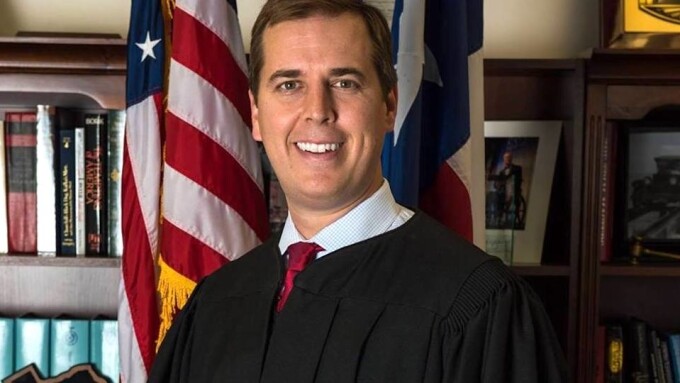AUSTIN, Texas — In a stunning 33-page decision, the Texas Supreme Court denied Facebook’s liability immunity for third-party content based on Section 230 — the so-called “First Amendment of the internet" — with the majority opinion quoting FOSTA/SESTA to state that Section 230 “was never intended to provide legal protection to websites that facilitate traffickers in advertising the sale of unlawful sex acts with sex trafficking victims.”
The opinion, penned by Justice Jimmy Blacklock, denied Facebook’s motion to “dismiss all claims against it as barred by section 230 of the federal ‘Communications Decency Act’ (‘CDA’), which provides that ‘[n]o cause of action may be brought and no liability may be imposed under any State or local law that is inconsistent with this section.’”
Justice Blacklock was appointed to the state Supreme Court by Texas Governor George Abbott, and was previously appointed to the DOJ Civil Rights Division by President George W. Bush. Two of the eight Justices did not participate in the decision.
Plaintiffs in three state civil cases allege that they were “victims of sex trafficking who became entangled with their abusers through Facebook. They assert claims for negligence, negligent undertaking, gross negligence and products liability based on Facebook’s alleged failure to warn of, or take adequate measures to prevent, sex trafficking on its internet platforms.”
According to the decision, the plaintiffs “also assert claims under a Texas statute creating a civil cause of action against those who intentionally or knowingly benefit from participation in a sex-trafficking venture.”
A FOSTA/SESTA-Influenced Reading of Section 230
Blacklock, in an explicitly FOSTA/SESTA-influenced reading of the federal law, wrote that a majority of Texas Supreme Court justices “do not understand section 230 to ‘create a lawless no-man’s-land on the Internet’ in which states are powerless to impose liability on websites that knowingly or intentionally participate in the evil of online human trafficking.”
“Holding internet platforms accountable for the words or actions of their users is one thing, and the federal precedent uniformly dictates that section 230 does not allow it. Holding internet platforms accountable for their own misdeeds is quite another thing. This is particularly the case for human trafficking,” Blacklock added. He then directly invoked FOSTA/SESTA, writing: “Congress recently amended section 230 to indicate that civil liability may be imposed on websites that violate state and federal human-trafficking laws. See Allow States and Victims to Fight Online Sex Trafficking Act (“FOSTA”), Pub. L. No. 115-164, 132 Stat. 1253 (2018). Section 230, as amended, does not withdraw from the states the authority to protect their citizens from internet companies whose own actions — as opposed to those of their users amount to knowing or intentional participation in human trafficking.”
Language of Section 230 Sharply Criticized
Blacklock rebuked the very text of Section 230, calling it “no model of clarity,” and asserting that “there is ample room for disagreement about its scope.”
“Despite the statutory text’s indeterminacy, the uniform view of federal courts interpreting this federal statute requires dismissal of claims alleging that interactive websites like Facebook should do more to protect their users from the malicious or objectionable activity of other users,” the Texas Supreme Court declared.
“The plaintiffs’ claims for negligence, negligent undertaking, gross negligence, and products liability all fit this mold," the decision continued. "The United States Supreme Court — or better yet, Congress — may soon resolve the burgeoning debate about whether the federal courts have thus far correctly interpreted section 230 to bar such claims. Nevertheless, the prevailing judicial interpretation of section 230 has become deeply imbedded [sic] in the expectations of those who operate and use interactive internet services like Facebook. We are not interpreting section 230 on a clean slate, and we will not put the Texas court system at odds with the overwhelming federal precedent supporting dismissal of the plaintiffs’ common-law claims.”
Potential Impact for Adult Industry
Industry attorney Corey Silverstein told XBIZ that the Texas Supreme Court decision "is yet another terrible ruling and dent in Section 230 protection."
"While I do not agree with the ruling, unfortunately, I am not surprised because this is a continuation of a pattern in this country where courts are fundamentally ignoring — or not understanding — the purpose of Section 230," Silverstein added.
Free speech and Section 230 specialist James Czerniawski, Tech and Innovation Policy Analyst at Utah’s free-market think tank Libertas Institute, explained that "the Texas Supreme Court, in dicta, seemed to make a bizarre suggestion that Section 230(e)(5) (the FOSTA carveout) should be interpreted to cover similar state sex trafficking laws."
Should that play out, Czerniawski admonished, "it would have an extraordinarily chilling effect on the adult services providers that would be forced to comply not only with FOSTA, but also a host of conflicting state anti-pornography laws, dressed as sex-trafficking regulations."
Main Image: Texas Supreme Court Justice Jimmy Blacklock (Source: Texas Supreme Court)








